23, January 2022
German navy chief resigns over controversial comments on Putin, Crimea 0
Germany’s navy chief stepped down on Saturday after drawing criticism for saying Russian President Vladimir Putin deserved respect and that Kyiv would never win back annexed Crimea from Moscow.
“I have asked Defence Minister Christine Lambrecht to relieve me from my duties with immediate effect,” Vice Admiral Kay-Achim Schoenbach said in a statement. “The minister has accepted my request.”
Schoenbach made the remarks to a think-tank discussion in India on Friday, and video was published on social media. The comments came at a sensitive time as Russia has amassed tens of thousands of troops on Ukraine’s borders.
Diplomatic efforts are focused on preventing an escalation. Russia denies it is planning to invade Ukraine.
Vice Admiral Kay-Achim Schönbach: “We need #Russia to counter #China. #Putin and Russia deserves respect, #Ukraine has nothing to do with #NATO and #Crimea has been permanently lost.”
In New Delhi, Schoenbach, speaking in English, said Putin seeks to be treated as an equal by the West.
“What he (Putin) really wants is respect,” Schoenbach said.
“And my God, giving someone respect is low cost, even no cost… It is easy to give him the respect he really demands – and probably also deserves,” Schoenbach said, calling Russia an old and important country.
Schoenbach conceded Russia’s actions in Ukraine needed to be addressed. But he added that “the Crimea peninsula is gone, it will never come back, this is a fact,” contradicting the joint Western position that Moscow’s annexation of the peninsula from Ukraine in 2014 cannot be accepted and must be reversed.
Apologies
Prior to Schoenbach’s resignation, the defence ministry publicly criticised his remarks, saying they did not reflect Germany’s position in either content or wording.
Schoenbach apologized for his comments.
“My rash remarks in India … are increasingly putting a strain on my office,” he said. “I consider this step (the resignation) necessary to avert further damage to the German navy, the German forces, and, in particular, the Federal Republic of Germany.”
The Ukrainian Foreign Ministry had called on Germany to publicly reject the navy chief’s comments. Schoenbach’s comments could impair Western efforts to de-escalate the situation, Ukraine said in a statement.
“Ukraine is grateful to Germany for the support it has already provided since 2014, as well as for the diplomatic efforts to resolve the Russian-Ukrainian armed conflict. But Germany’s current statements are disappointing and run counter to that support and effort,” Ukraine’s Foreign Minister Dmytro Kuleba said separately in tweet.
Source: REUTERS
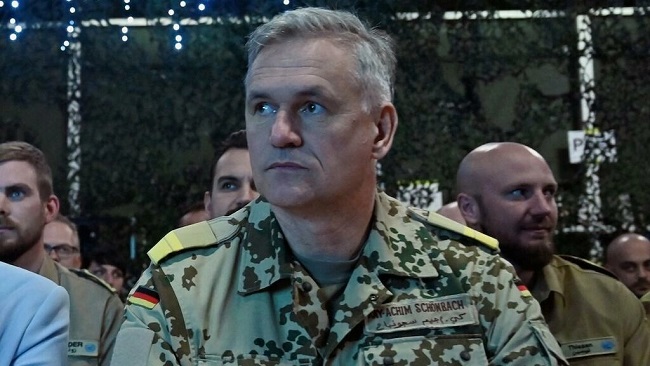
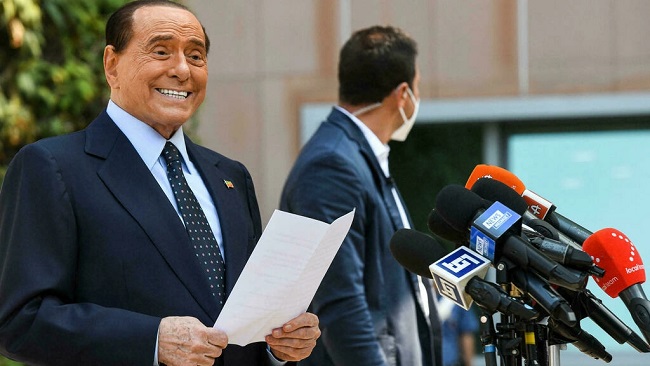
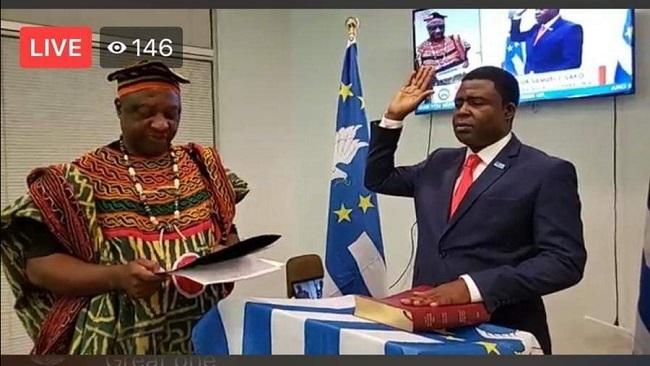

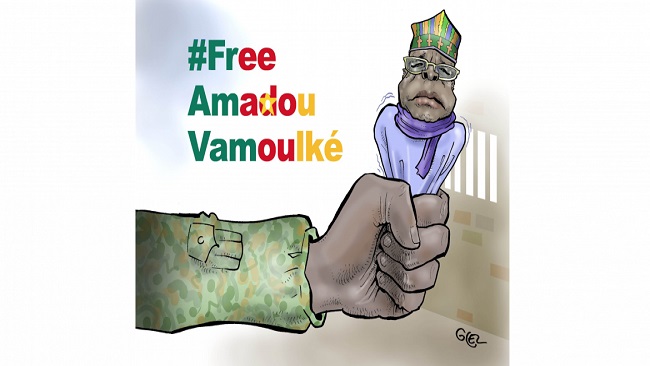



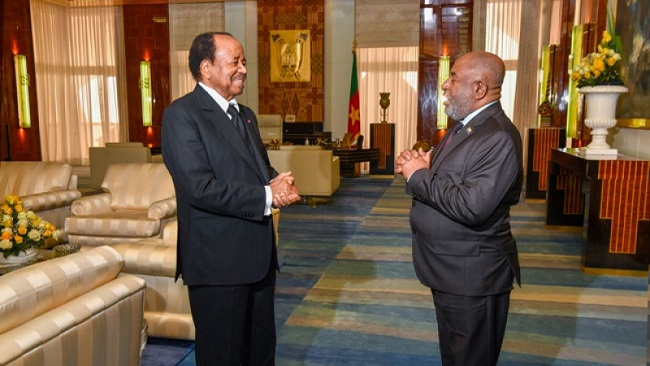

















23, January 2022
Yaoundé: Jacques Fame Ndongo is losing sleep 0
When he went seeking glory at the VIP lounge of the Olembe Stadium, an architectural masterpiece, Jacques Fame Ndongo, Cameroon’s higher education minister, did not know he was stirring a hornet’s nest.
Fame Ndongo has been in the spotlight for all the wrong reasons on many occasions and he knows he is not the most loved Cameroonian at this time, especially as he belongs to a government and a political party that has messed up things in a country once considered as an oasis of peace in a desert of chaos.
Fame Ndongo is no stranger to controversy and has crossed some of the reddest of the red lines which could have taken him to the Yaounde Maximum Security Prison known as Kondengui.
A few years ago, he manufactured a story about supplying laptops to Cameroon’s university students as a way of making the country’s president, Paul Biya, popular among the country’s youths; a story the head of state took down hook, line and sinker.
But Fame Ndongo’s real objective was not to make the president popular. He wanted to feather his own nest. A project worth millions of dollars was a great opportunity for him to serve his parochial and selfish interest.
Fame Ndongo, a man noted for his grandiloquence, thought that things would just work like a conveyor belt and that the proceeds of his crime would hit his bank account with relative ease.
He is a man who overestimates himself and he thought he would make quick work of the challenging project which became a millstone around his neck.
Once the project started hitting many bumps in its path, the learned professor came up with fake computer science theories he himself did not understand, sometimes enlisting his collaborators in crime to come and help him bamboozle Cameroonians who were already in the know of his selfish and misleading intentions.
The massive online protests about his embezzlement of funds allocated for the laptop computer program finally caught the president’s attention and many thought he would be caught out of the government in the next cabinet reshuffle.
During a ceremony in 2019 wherein cabinet ministers were extending their New Year Wishes to the head of state, Fame Ndongo, the desperate higher education minister, wanted to use that opportunity to demonstrate his enduring loyalty and unwavering support to President Paul Biya, but he was soundly and roundly humiliated in plain sight by the president.
The message was clear! Fame Ndongo was in trouble and his next destination was clearly visible. Kondengui has been a good place for many cabinet ministers who have fallen out of favor with the president and Fame does not like that residence.
In the cabinet reshuffle that succeeded that incident at the Unity Palace, Fame Ndongo was maintained in his position after many letters to the president and following the timely intervention of the president’s trusted friends.
But old habits diehard. Fame Ndongo will always be a repeat offender. He likes fame and loves lining his pocket with money that is not his.
It was fame that took him to the VIP lounge on that day when the Indomitable Lions were working hard to make Cameroonians proud.
Fame Ndongo, for his part, had organized a massive and a costly drinking party that has left Cameroonians heartbroken.
The cost of the wines, which were being consumed by Fame Ndongo’s lackeys, is what has angered Cameroonians. They could not believe their eyes and ears. To many, that is just the tip of the wasteful iceberg that is ruining the country.
A bottle of wine consumed by people who earn less than CFAF 40,000 was more than CFAF 3 miilion and many of such bottles of wine were uncorked on that unfortunate day.
A video of the party, which seemed to have been made in Heaven, tells of a bunch of sycophants forged in the crucible of corruption, extoling the virtues of the pompous and bombastic higher education minister.
But the fame Fame Ndongo got on that has become the next millstone around his neck. The head of state, Paul Biya, has ordered an investigation into the incident.
Social media has become a tool of governance and citizens in Cameroon and abroad are using it now as a whistleblowing mechanism which is causing many government officials to lose sleep.
Fame Ndongo is once more in hot water. He knows he has been in the eye of the storm for a long time and the wine incident may just be the last straw that might open the gates of Kondengui for him.
But it is not yet over. Fame Ndong still holds a trump card. He knows that the president loves his collaborators to always bow to him like angels do to God.
Being the crook he has always been, the learned criminal has already issued a motion of support, pledging his unalloyed support to the head of state in whatever the president does.
Fame Ndongo has roped in hundreds of people from the country’s South region just to demonstrate that the South, led by him, is solidly behind the president.
But this last gimmick may not work. The investigation has been launched and those in charge of the enquiry are already doing their work. The are meticulously analyzing the video and some of those identified in the video have already been questioned.
There is panic within the professor’s cycle and things are not really looking good for the man who erroneously holds that he can spin the presidential couple around his finger.
According to a disgruntled source close to the arrogant minister of higher education, the man is no longer at ease. He has already briefed his entourage on what to say if questioned and this situation is already consuming him.
“The professor has already briefed his collaborators in crime on what to say. All of them are losing sleep and are looking for ways to demonstrate that the minister bought the drinks out of pocket, but the government’s records are telling a different tale” the source said.
“However, he does not understand that there are two issues involved. The video does not only show that the minister is wasteful, it also demonstrates that he is not discreet. Mr. Biya hates it when his collaborators get caught in situations which portray his government as being wasteful and arrogant. The negative optics are killing the president and Fame Ndongo is regretting that moment of indiscretion,” the source added.
Mr. Ndongo might have issued his motion of support but it is not clear if it will spare him the agony he is putting himself through.
Before the investigation gets concluded, Fame Ndongo would have become a shadow of his former self. He is losing sleep and given that Biya likes holding his cards so close to his chest, the learned professor might end up with a stroke before the findings of the enquiry are released.
By Soter Tarh Agbaw-Ebai